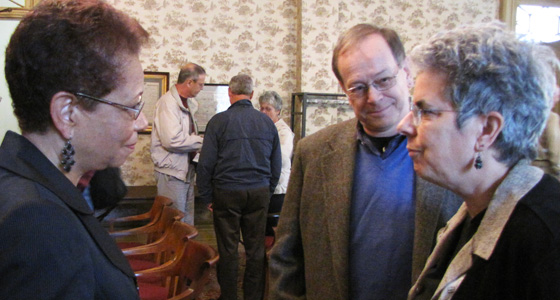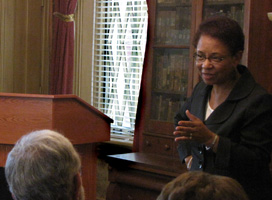

Venture Boldly

 by Stephen Danilovich ‘14
by Stephen Danilovich ‘14
Abraham Lincoln, one of the most-examined figures in American history, still remains "fun to study," historian Edna Greene Medford said at Knox College, where Lincoln once debated Stephen Douglas.
"You're never going to be bored," Medford said about the 16th U.S. president. "You'll always find something new."
Medford's September 16 lecture at Knox, titled "Haiti and Liberia During the Lincoln Presidency," explored Lincoln's relationship with those two countries. The event was sponsored by the Lincoln Studies Center at Knox College. Medford is a member of the center's Board of Advisors.
An author and a professor at Howard University, Medford specializes in 19th century African-American history. She teaches courses in the Civil War and Reconstruction, Colonial America, the Jacksonian Era, and African-American history.
Medford (shown in photo above, at left, with Knox College faculty members David Amor and Penny Gold) began her lecture by discussing Lincoln's first annual message to Congress. In his address, he mentioned Haiti and Liberia and urged recognition of these black-controlled governments.
Although Lincoln kept to economic arguments, illustrating Haiti and Liberia as opportunities for commerce, formalizing diplomatic relations with the countries would be "a means to an end," Medford said.
This end was the colonization of Liberia and Haiti by African-Americans. Lincoln believed that colonization represented a solution to America's racial difficulties.
 "He was fully aware that this was a controversial topic," she said.
"He was fully aware that this was a controversial topic," she said.
Lincoln thought that by sending blacks to their "native" land, both races could prosper independently. The separation of race, in his eyes, was the most practical alternative to a blending of races.
Despite resistance from Southern states, Lincoln finally signed a bill into law that would open U.S. diplomatic relations with Haiti and Liberia.
Not long afterward, a group of 500 African-American men, women, and children set out for the Haitian coast. But the experiment failed, and the Navy was dispatched to rescue the survivors of a poorly planned effort.
Although Lincoln's idea of colonization never came to full fruition, Medford's lecture illustrated how his attitude fit into the broader historical question of slavery in America, and it delved especially into the black perspective on this issue.
Medford paid particular attention to the enigmatic personality of Lincoln himself, pointing out his complexities and contradictions. The lecture ended with a question-and-answer session and a reception in Ferris Lounge.
Photos by Hongyu "Sophie" Zhou '14
Published on September 20, 2011